Friday 13th March 2015
Day 1
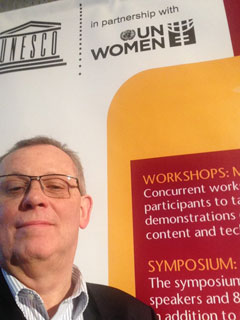 I arrived at UNESCO's headquarters in Paris to take part in the annual Mobile Learning Week, arranged by UNESCO and a range of development agencies and educational organisations like DFID, GIZ, UNICEF, alongside high tech companies like Microsoft, Intel and Qualcomm.
I arrived at UNESCO's headquarters in Paris to take part in the annual Mobile Learning Week, arranged by UNESCO and a range of development agencies and educational organisations like DFID, GIZ, UNICEF, alongside high tech companies like Microsoft, Intel and Qualcomm.
I've presented at the last few UNESCO symposia on the integration of mobile learning in English language teaching, and on the role of English in providing support for emerging economies through international development. Most of the presentations though are about general education issues, and this year the focus is on ‘Leveraging technology to empower women and girls’.
We learned about projects from China, India, Costa Rica and Sierra Leone..."
The week was kicked off by David Atchoarena, Director of Education at UNESCO, and Patience Stephens of UN Women, emphasising the need to expand access to education and ensuring gender equity in that access.
Delegates come from organisations that see mobile learning as an important tool in democratising learning, improving access, inclusivity and equity, and developing better student outcomes. A word of clarification – in these circles, ‘mobile learning’ refers to students and teachers using devices you can move around, take from class to class and take home – referring to the mobility of the device, not its phone connection. Thus it refers to learning based on the use of tablets and even laptops as well as different kinds of phones. UK delegates sometimes assume it means phone-based learning, but only in UK English does ‘mobile’ mean a phone. For American colleagues it’s a cell, for Germans a Handy, so ‘mobile learning’ is used more broadly.
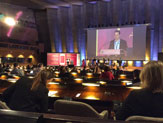 We learned about projects from China, India, Costa Rica and Sierra Leone, on topics as wide-ranging as helping women to pursue STEM careers, inspiring girls through games and coding, using digital storytelling, using collaboration to empower girls in science education, using Bluetooth to teach women about Ebola, using mobiles to develop inclusivity for elderly migrant women, and designing gender-sensitive mobile apps.
We learned about projects from China, India, Costa Rica and Sierra Leone, on topics as wide-ranging as helping women to pursue STEM careers, inspiring girls through games and coding, using digital storytelling, using collaboration to empower girls in science education, using Bluetooth to teach women about Ebola, using mobiles to develop inclusivity for elderly migrant women, and designing gender-sensitive mobile apps.
All inspiring projects which have wider, deeper, higher quality educational outcomes at their core, delivered by people who understand the need for assessment of learner outcomes but who are also increasingly focused on impact studies, to ensure development funding gets the best return. There is a new movement called ICT4E, focused on evaluation studies of ICT projects, which is rapidly gaining adherents and in which Cambridge Assessment could surely provide a leadership role.
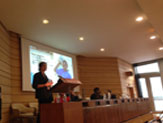 English is still somewhat below the radar, though not completely absent. There is still a lack of emphasis on English skills, with donors, aid agencies and NGOs tending to assume that there are enough English-speakers in most countries to help them deliver their programmes - without always helping to increase the level of English proficiency first.
English is still somewhat below the radar, though not completely absent. There is still a lack of emphasis on English skills, with donors, aid agencies and NGOs tending to assume that there are enough English-speakers in most countries to help them deliver their programmes - without always helping to increase the level of English proficiency first.
Of course, many programmes are delivered in the local language (eg: first language literacy and numeracy skills) but in so many areas (especially India & Africa) the use of English as an official language of education means that more explicit emphasis needs to be put on English skills. We at Cambridge English can play a major role in helping policymakers and donors in these areas develop better policy guidelines, better project plans based on baseline evidence, better learner outcomes measured by our assessment instruments, and better projects with higher ROI measured by our impact and evaluation tools.
We have to help policymakers raise the standard of English and get away from the idea (prevalent in some English-medium schools) that "they will pick it up as they go along’’.
Day 2
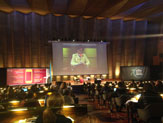 Day 2 of the symposium was introduced by Cherie Blair, representing her foundation's programmes for women. A good presentation by Tony Bloome of USAID introduced the work of the Washington-based and USAID-funded mEducation Alliance (on whose steering committee I sit), which brings together public and private sector partners in the mobile space.
Day 2 of the symposium was introduced by Cherie Blair, representing her foundation's programmes for women. A good presentation by Tony Bloome of USAID introduced the work of the Washington-based and USAID-funded mEducation Alliance (on whose steering committee I sit), which brings together public and private sector partners in the mobile space.
I met with Microsoft who are very dedicated to literacy programmes in the developing world and are keen to work with us to provide learning content and, potentially, language assessment. The educational arms of Intel, Hewlett-Packard, Vodafone, Qualcomm were all there as well, looking to connect with partners in the educational world, not to sell their products (at least directly) but to build a positive brand perception.
All of these players have dedicated CSR (corporate social responsibility) budgets and staff and see investing in education as a step to building their future business as well as their current sales.
this was a truly inspiring international event with a clear focus on empowering women and girls..."
I also met with many smaller organisations from which we can learn. For example, one company is delivering bite-size educational content over SMS to rural communities, using simple texts via cheap and basic phones in distant villages. The added value from this company is that they have set up a brokering system, where they build relationships with the mobile network operators in key developing markets and link them to content providers (like ourselves) thus cutting down the investment of time and money required to set up these links from scratch.
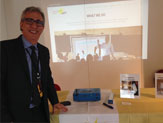 One small company is demonstrating a battery-driven classroom server (blue box pictured,left, in use) that incorporates an Android tablet and pre-loaded lesson materials, a wifi network to share this content with the students in the class, and a digital projector to display lesson materials on the classroom wall. Everything you need for a digital lesson – without the need for internet connectivity or even electricity in the class or even the school.
One small company is demonstrating a battery-driven classroom server (blue box pictured,left, in use) that incorporates an Android tablet and pre-loaded lesson materials, a wifi network to share this content with the students in the class, and a digital projector to display lesson materials on the classroom wall. Everything you need for a digital lesson – without the need for internet connectivity or even electricity in the class or even the school.
Other presentations on day two focused on girls education in Bangladesh; using mobile games for environmental lessons in Egypt; using Raspberry Pi to teach science in Africa; health education in the Amazon, and teaching ICT in Cambodia.
In short, this was a truly inspiring international event with a clear focus on empowering women and girls and delivering higher quality education across the board in low resource economies.
...this work is vital, it is being carried out by dedicated and professional educators..."
It was clear to all participants that this work is vital, it is being carried out by dedicated and professional educators, and the people who are being supported are the consumers of the future, whose children will be the customers of the future for first world businesses. I was fortunate to have been part of this event for the last few years and I hope more Cambridge Assessment colleagues can get involved in the future.
Michael Carrier
Director of Strategic Partnerships, Cambridge English Language Assessment